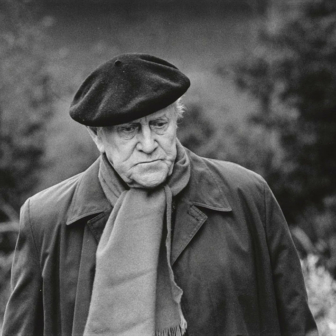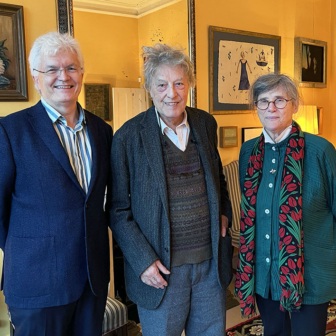“Oral biography” is not perhaps a descriptor we would immediately place among film’s genre possibilities, but Garry Sturgess’s Barry Jones: In Search of Lost Time makes an eloquent case for its cinematic potential. “Documentary” doesn’t seem quite adequate to describe the “film story” he has assembled here, for Barry Jones looks more like a life being performed on screen with an audience in attendance.
Who is — or, as he himself says, was — Barry Jones? Unlike most people, he is a little older than I am, but our lifespans overlap sufficiently for me to remember how he became a household name. He was the quiz champion in Bob Dyer’s game show, Pick-a-Box, which we all listened to in the heady days of “wireless” in the late forties and early fifties, before the program made the leap into television in 1957. It seemed never to matter what the subject was; Barry always knew the answer. When, as the film reminds us, Dyer asked him if he could name the first two American presidents, he offered to name them all. Later, people in the street would stop him and ask “Are you Barry Jones?” to which he would reply “I used to be,” and Sturgess’s film investigates, with Jones’s willing on-screen presence, what that “used to be” was all about.
The film reveals a mind that was avidly open to so much of what life can offer — and, in being so, resonated potently with the wider life of the country around him. It opens with the present-day Jones, in a maroon jacket and tie that recall dressier times, with a list of film titles scrolling over this image. This is the wildly eclectic list of the films that have mattered most to him, embracing Popeye and Snow White (which “excited and terrified” him as “an eager filmgoer from age five”), Charlie Chaplin, Citizen Kane, Olivier’s Hamlet and The Third Man, as well as Nashville and, as recently as 2014, Mr Turner.
Between the ages of five and nine young Barry found that it was film that had the greatest impact on him, with its way of “taking me out of the immediate.” At that stage, his favourites ranged from the Marx Brothers to the expatriate German actor Conrad Veidt. The first film he saw alone was Dr Ehrlrich’s Magic Bullet, about the search for a drug to cure syphilis, and here, in this search for lost time, he senses a trajectory that extended its reach to the 1980s, when he became science minister in the Hawke government. It wasn’t only film, though, that fertilised this mind rapacious for knowledge. By the time he was in fifth grade he had memorised a list of all the kings of England and reading had become his “major interest.”
The film doesn’t make the mistake — or at least take the risk — of featuring endless eulogies from contemporaries and colleagues, but it draws early on two important ones. One-time foreign minister Gareth Evans describes Jones as “a national treasure” and social commentator/broadcaster Phillip Adams talks of Jones as one “incapable of telling a lie.” The first of these comments puts the onus on the film to justify the pronouncement; the second is crucial to us, the viewers, in responding to Jones’s own recollections of his intellectually packed life. The film enables us to understand these two encomia, and does so without an endless parade of talking heads.
The main talking head, of course, belongs to Jones. There is something compelling about his unflinching dealings with the camera as it tries to come to terms with “How My Mind Works” — one of the film’s intertitles that recall the days of silent cinema, about which Jones is also knowledgeable. From his earliest days, he was obsessed with amassing facts and list-making. As Bob Dyer later found, he never forgot anything — or, if he did, he had the lists to fall back on. He considered the mind “a great memory bank” that runs on “context, application, passion.” Well, it has to be conceded that these served him well.
It is astonishing to find the intellectual range so amply represented. It’s not just a matter of American presidents or English kings or film titles (though the latter are vividly present): the passion for film and reading were there very early, but not much later music and art would demand accommodation. Along with excerpts from key films at key points in the narrative come shots of works of art, such as Rembrandt’s The Two Philosophers, with which he was “intoxicated,” and the sound of the orchestral music that became a passion after he saw the conductor Leopold Stokowski in a film called One Hundred Men and a Girl.
By now, you might think the mind was adequately stocked for both pleasure and learning. But there was another world beyond that of the arts, often far less attractive but also demanding attention. Jones was just old enough to register Hitler’s villainy, to be aware of the Munich crisis and of prime minister Robert Menzies’s urging Australia to war in 1939. In fact, he kept his own war diaries and tells us that, at age eight, he already felt the “strong political impact” of what he read of the war — and of the film depiction of Hitler by Chaplin in The Great Dictator. The film makes clear the emergence of political sensitivity from an early age, gathering force with his response to the execution of Ronald Ryan in 1967, which Jones saw as “the illegitimate use of state power” and the unbearable idea of “death by appointment.”
In dealing with so intellectually crowded a life, Sturgess nevertheless manages to imbue the film with the actual living of it. Jones talks of his father’s world as “that of Willy Loman” and, as he discusses his death, a shot from the TV film version of Death of a Salesman is shown behind his head. He felt he never knew his father well, that they never had much in common. This family background, involving ten moves during his parents’ marriage, including several after Jones’s birth in Geelong, and his education are evocatively rendered, partly through his commentary, partly through sepia and black-and-white photographs.
Phillip Adams, in accounting for what he sees as Barry Jones’s exceptional gifts, proffers the theory that Jones was the survivor, along with Superman, of the explosion of the planet Krypton. Jones himself suggests a more prosaic explanation: he has seen life as an endless quest, a search for meaning, and while he is “Waiting for Godot” (a final intertitle) he still feels as he always has: “I’ve got to find out more to understand this event.”
Garry Sturgess — as director, editor, co-screenwriter (with Jones) and producer — has made an absorbing account of a remarkable life. As for Jones, he emerges as self-aware but never self-aggrandising. Sturgess has found a fascinating subject and Jones has found an astute biographer. ●




